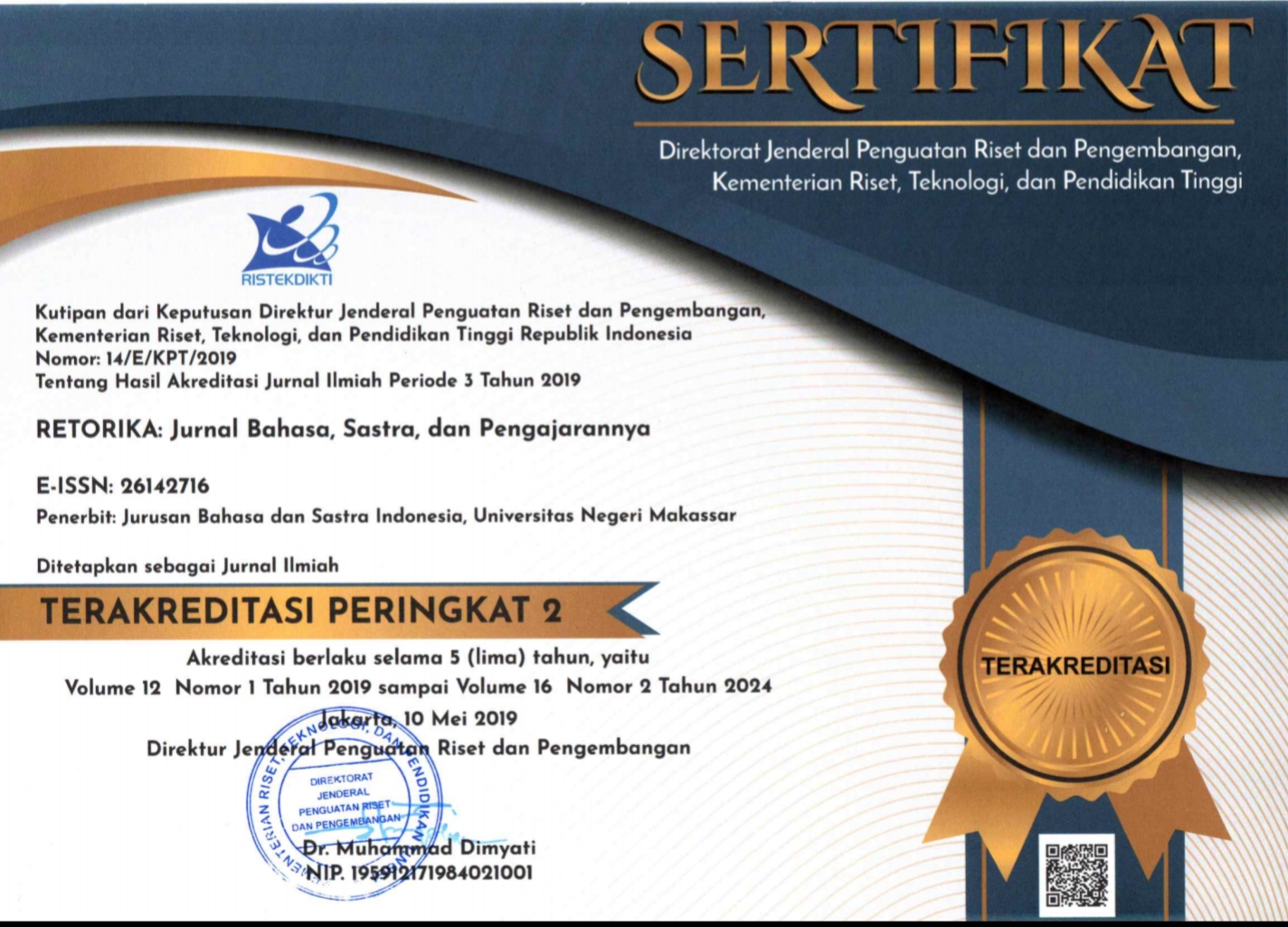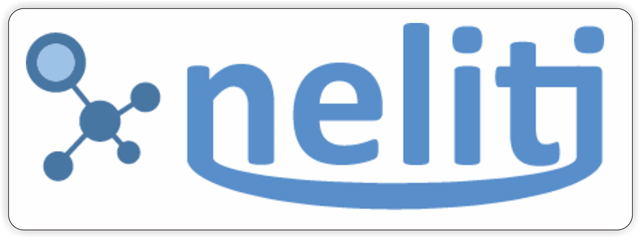SHORT STORY LEARNING MODEL BASED ON CREATIVITY DEVELOPMENT
(1) Universitas PGRI Madiun
(2) Scopus ID: 57200991886, IAIN Syekh Nurjati, Cirebon, Indonesia
(*) Corresponding Author
DOI: https://doi.org/10.26858/retorika.v13i2.13696
Abstract
This study aimed to describe: (1) the short story learning conditions of the research setting, (2) the needs of students and lecturers about the short story learning model, (3) the development of the short story learning model based on creativity development, and (4) the effectiveness of the short story learning model based on creativity development. The results showed that 1) the short story learning process was teacher-centered and was theoretical and had not been able to develop student creativity; 2) produce a prototype of a short story learning model based on creativity development that has been validated by experts ; 3) conducting limited and extensive trials; 4) the creativity-based short story learning model was effective in improving students’ short story appreciation ability.
Keywords
Full Text:
PDFReferences
Alfuhaigi, S. S. (2015). School Environment and Creativity Development: a review of Literature. Journal of Educational and Instructional Studies, 5(2), 33–37.
Ball, A., Joyce, H. D., & Anderson-butcher, D. (2016). Exploring 21st Century Skills and Learning Environments for Middle School Youth. International Journal of School Social Work, 1(1), 1–17.
Bialik, M., & Fadel, C. (2015). Skills for the 21 st Century: What Should Students Learn? Boston: Center for Curriculum Redesign.
Cebri, G., Junyent, M., & Mul, I. (2020). Competencies in Education for Sustainable Development : Emerging Teaching and Research Developments. Sustainability, 12(579), 1–9.
Colliander, H., Ahn, S. E., Andersson, P., & Colliander, H. (2018). Actions and Conceptions : Exploring Initial Literacy Teaching Practice for Adults Actions and Conceptions : Exploring Initial Literacy Teaching Practice for Adults. Journal of Language, Identity & Education, 17(5), 306–319. https://doi.org/10.1080/15348458.2018.1465344
Egizii, R. (2015). Self-Directed Learning, Andragogy and The Role of Alumni as Members of Professional Learning Communities in The Post-Secondary Environment. Procedia - Social and Behavioral Sciences, 174, 1740–1749. https://doi.org/10.1016/j.sbspro.2015.01.832
Fajria, A. (2018). Persepsi Mahasiswa PBI terhadap Penerapan Pembelajaran Aktif Menggunakan Model Pembelajaran Kooperatif pada Mata Kuliah Drama, Prose, Poetry. Jurnal Lingua Applicata, 2(2), 91–110.
Gall, M. D., Gall, J. P., & Borg, W. R. (2003). Educational Research: An Introduction. Boston: Pearson Education.
Hartman, A. K., Borchardt, J. N., & Bozer, A. L. H. (2017). Making Primary Literature Come Alive in the Classroom. Journal of Undergraduate Neuroscience Education, 15(2), 1–9.
Kupers, E., Lehmann-wermser, A., Mcpherson, G., & Geert, P. Van. (2019). Children ’ s Creativity : A Theoretical Framework and Systematic Review. Review of Educational Research, 89(1), 93–124. https://doi.org/10.3102/0034654318815707
Lambrechts, W., & Hindson, J. (2016). Research and Innovation in Eduation for Sustainable Development. Austria: Environment and School Initiatives.
Mulyaningsih, I., Suwandi, S., Setiawan, B., & Rohmadi, M. (2018). PARMI (Production, Attention, Retention, Motivation, and Innovation): an Alternative to Improving Scientific Writing Skills. Lingua Cultura, 12(4), 317–321. https://doi.org/10.21512/lc.v12i4.4159
Nortvig, A., Petersen, A. K., & Balle, S. H. (2018). A Literature Review of the Factors Influencing E-Learning and Blended Learning in Relation to Learning Outcome , Student Satisfaction and Engagement. The Electronic Journal of E-Learning, 16(1), 46–55.
Ritter, S. M., & Mostert, N. (2017). Enhancement of Creative Thinking Skills Using a Cognitive-Based Creativity Training. J Cogn Enhanc, 1(1), 243–253. https://doi.org/10.1007/s41465-016-0002-3
Sadykova, A. G., & Shelestova, O. V. (2016). Creativity Development : The Role of Foreign Language Learning. International Journal of Environmental & Sciense Ecucation, 11(15), 8163–8181.
Sali, G. (2015). A Longitudinal Study on the Development of Creativity in Children. Antropologist, 20(1), 93–100.
Schrijvers, M., Janssen, T., Fialho, O., & Rijlaarsdam, G. (2016). The Impact of Literature Education on Students` Perceptions of Self and Others: Exploring Personal and Social Learning Experiences in Relation to Teacher Approach. Educational Studies in Language and Literature, 16(1), 1–37.
Setyaningsih, N. H., Febriani, M., & Zuliyanti, Z. (2018). Persepsi Dosen dan Mahasiswa terhadap Pembelajaran Apresiasi Sastra Berperspektif Gender. Jurnal Pendidikan Bahasa Indonesia, 6(2), 138–151.
Suhendi, D. (2017). Menggagas Pembelajaran Satra yang Kreatif dan Inovatif di Perguruan Tinggi: Sejarah Sastra Sebagai Model. In Seminar Nasional Bulan Bahasa 2017 FKIP Universitas Sriwijaya Palembang (pp. 73–81).
Sukmadinata, N. S. (2010). Metode Penelitian Pendidikan. Bandung: Remaja Rosdakarya.
Syahrul, N. (2017). Pembelajaran Sastra Indonesia dalam Konteks Global Problematika dan Solusi. In Seminar Nasional PS PBSI FKIP Universitas Jember (pp. 197–208).
Vedishenkova, M. V, & Kadyrova, F. R. (2016). Features of Assessment Activity at the Lessons of Literature. Mathematics Education, 11(1), 339–345. https://doi.org/10.12973/iser.2016.21035a
Weimer, M. (2002). Learner-Centered Teaching: Five Key Changes to Practice. San Francisco: Wiley Company.
White, H., & Sabarwal, S. (2014). Quasi-Experimental Design and Methods. Italy: United Nations Children`s Fund (UNICEF).
Wiryosutomo, H. W., Hanum, F., & Partini, S. (2019). History of Development and Concept of Person-Centered Counseling in Cultural Diversity. International Journal of Educational Research Review, 4(1), 56–64.
Yuhartanti, Y., Juita, N., & Asri, Y. (2018). Increasing Writing Skills In Text Based Short Story (Folklore) Through Audio Visual Media. In Advances in Social Science, Education and Humanities Research (Vol. 263, pp. 281–285). International Conference on Language, Literature, and Education (ICLLE).
Yunus, M. (2015). Challenges and Alternative of Creativity Development In Higher Education. Journal of Humanity, 3(2), 67–77. https://doi.org/10.14724/jh.v3i2.39
Article Metrics
Abstract view : 600 times | PDF view : 75 timesRefbacks
- There are currently no refbacks.
Copyright (c) 2020 Bambang Eko Hari Cahyono, Indrya Mulyaningsih

This work is licensed under a Creative Commons Attribution-NonCommercial 4.0 International License.
Published by:
Department of Indonesian Language, Faculty of Languages and Literature, Universitas Negeri Makassar in cooperate with Asosiasi Dosen Bahasa dan Sastra Indonesia (ADOBSI) and Ikatan Program Studi Pendidikan Bahasa dan Sastra Indonesia (IKAPROBSI).
Address: Department of Indonesian Language Office, DG Building Second Floor, UNM Parangtambung, Daeng Tata Raya Street, Makassar, South Sulawesi, Indonesia
 Email: retorika@unm.ac.id
Email: retorika@unm.ac.id

RETORIKA: Jurnal Bahasa, Sastra,dan Pengajarannya is licensed under a Creative Commons Attribution-NonCommercial 4.0 International License.
















